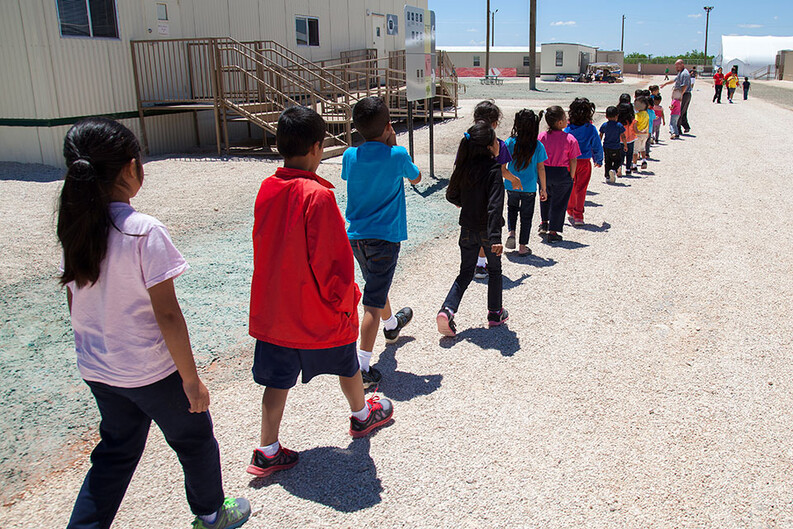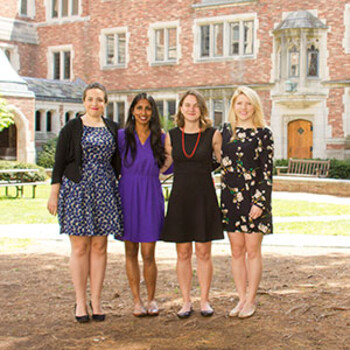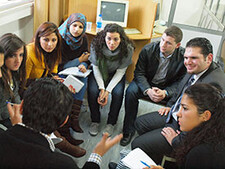In a Time of Refugees

[This feature story appeared in the Winter 2017 Yale Law Report and was written prior to the Trump administration's actions on immigration. The story highlights the work of two student-founded organizations, the Asylum Seeker Advocacy Project 4(ASAP) and International Refugee Assistance Project (IRAP)5, which provide legal assistance to refugees and asylum seekers in the Middle East and Central America.]
The stories are hauntingly similar. Single mothers and their young children enduring unthinkable violence and trauma, from sexual assault by abusive partners, to the murder of relatives, to gun fights outside their homes. In these grim situations, many families see only one way out of the incredible despair—fleeing to the United States to seek asylum.
For Alba Veronica Cruz Montano and her four-year-old daughter, that was the difficult choice she made as she fought for survival by fleeing El Salvador, a country with one of the highest murder rates for women.
“I knew about the dangers, but I was in despair and I asked God to get me to a place where I could be safe with my daughter and where no one would take her from me,” said Cruz Montano in a video posted by the United Nations about her struggle. “That’s why I took the risk.”
Cruz Montano and her daughter were two of the more than 20,000 women and children who were taken to an immigration detention center in Dilley, Texas, after crossing the border into the United States seeking refuge. They were also among the earliest clients of a newly formed organization called the Asylum Seeker Advocacy Project (ASAP) / Proyecto de Apoyo para Solicitantes de Asilo (PASA), founded at Yale Law School.

Conchita Cruz ’16, Swapna Reddy ’16, Dorothy Tegeler ’16, and Liz Willis ’17 co-founded ASAP in the spring of 2015 to respond to the unmet legal needs of Central American refugee families, both while detained in border detention facilities and after release. The project started as a volunteer effort funded by the Gruber Project for Global Justice and Women’s Rights at Yale when the co-founders traveled with fellow law students to the Texas detention center. There, they filled a gap in legal services by representing a Honduran mother at her trial, helping to secure her and her eight-year-old son’s legal status and release from the facility.
“It was so powerful to watch our client tell her son they had won their case and to see his look of excitement and disbelief that they were finally leaving the facility,” said Cruz. “Moments later she reminded us that there were many other families at Dilley fighting to stay in the United States who did not know where else to turn. It was difficult to leave Texas knowing we were leaving those families behind.”
With their client’s message in mind, ASAP’s co-founders created a team of remote Yale Law student volunteers to advocate on behalf of as many detained refugee families at their trials as possible. Since May 2015, ASAP has ensured universal representation for the dozens of refugee women and children forced to go to trial while detained at the Dilley family detention facility, winning every case that ASAP took on.
“Nationally, less than 2 percent of Central American families who are unrepresented in their trials are able to secure refugee status,” said Liz Willis. “But when families have lawyers, they are dramatically more likely to win. ASAP helps refugee families advocate for their right to remain in safety in the United States.”
In the fall of 2015, ASAP began to help refugees reverse the negative results of their preliminary asylum interviews and provide basic information to families in advance of their court hearings. One year later, in the spring of 2016, ASAP expanded once more in response to immigration raids, applying its remote representation model—originally developed to represent families while detained—to represent families who had received wrongful orders of deportation in immigration courts nationwide.
“ASAP brings legal services to refugee families across the country, and uses technology to build community power and increase access to education among formerly detained mothers,” said Swapna Reddy. “The majority of legal and community resources are concentrated in major cities, and we are finding ways to bring these resources to the underserved communities where indigent refugees are most likely to live.”
The incredible work underway through ASAP is based off a model that has proven successful before at Yale Law School. In 2008, students founded the International Refugee Assistance Project (IRAP) to provide direct legal services to refugees seeking resettlement in the United States. Through IRAP, teams paired with pro bono attorneys from private firms prepare a wide range of visa applications and appeals for clients fleeing persecution.
Reddy said that ASAP’s co-founders participated in IRAP as students, and saw how the group was able to develop an effective new model for representing vulnerable clients, when other, more experienced attorneys were hesitant to address the problem.
“Through IRAP, we understood the possibility of providing remote legal services to clients in areas where legal resources were scarce,” said Reddy. “ASAP took these lessons and developed our own model to represent refugee families who were scheduled for last-minute trials in U.S. detention centers.”
While IRAP creates teams of two students and one attorney to represent clients for the length of their cases, ASAP uses an assembly-line model, allowing volunteers to move in and out of cases according to their interest and availability, with only the attorney remaining constant.
Becca Heller ’10 was one of five students who co-founded IRAP, a group that included students with backgrounds in journalism, the military, and human rights.
“We all felt some obligation to deal with the humanitarian fallout of U.S. foreign policy in the Middle East,” recalled Heller. “We formed IRAP as a student organization to provide direct assistance to vulnerable Iraqi refugees at risk, and to do broader systemic advocacy to address the issue at a policy level.”

IRAP now has chapters at 29 law schools in the U.S. and Canada, and a wait list of six schools, Heller said. The group has partnered with 1,200 law students and lawyers at more than 75 law firms and eight multinational corporations to provide legal representation and counseling to thousands of refugees from 55 different countries.
“Our advocacy work has resulted in the passage of five different pieces of Congressional legislation, representing new rights and access to safe passage for 129,000 of the world’s most vulnerable refugees,” said Heller.
And with just over one year under its belt, ASAP has also produced impressive results, preventing the imminent deportation of more than 200 refugees through emergency legal filings; providing more than 1,000 refugee mothers with legal information and community through use of a private Facebook group; notifying thousands of families of upcoming hearings by text message; recruiting more than 200 active volunteers; and ensuring universal representation for the dozens of women and children forced to have a full immigration trial in the Dilley family detention center from May 2015 onward.
The remarkable results from both organizations are a testament to the hard work and dedication of the student founders and volunteers. But in both cases, the founders credit the support they received while students at YLS for giving them the tools and encouragement to make their dreams a reality.
“It really could not have happened at any other law school—we received incredible support from the faculty, in particular Professors Mike Wishnie ’93, Owen Fiss, and Muneer Ahmad, as well as funding for interpretation and travel to the Middle East,” said Heller. “The freedom, encouragement, and support that YLS gives students to pursue new interests and initiatives was key to IRAP coming into being.”
Since leaving YLS, Heller and IRAP’s organizers have had to learn how to get the group to stand on its own—starting a board, fundraising, and partnering with the Urban Justice Center in New York.
“It’s been a wonderful challenge,” said Heller. “But it also made me realize just how much institutional support I had received at Yale.”
The founders of ASAP agreed, noting how the flexibility in curriculum, clinical experiences, and faculty and student support made the organization possible. More than 250 members of the YLS community have supported ASAP’s efforts to date.
“Through my work with ASAP, I have found a community full of dedicated, passionate, and caring students, faculty, and staff,” said Willis, who continues to lead the student-driven efforts at YLS this year, along with Amit Jain ’18. “I am so thankful for the chance to learn from them and work alongside them to ensure basic rights for families seeking refuge in the United States.”
“The flexibility in Yale’s curriculum allowed us to focus on immigrants’ rights coursework even as first-year law students and, combined with opportunities in the clinical program, we were fortunate to have significant substantive knowledge to draw on when we started to work on immigration cases for Central American refugee families,” added Cruz.
ASAP’s founders credit Professor Wishnie for teaching them about zealous advocacy, Assistant Dean Sara Lulo for being an early champion of the project, and their small group professors—William Eskridge ’78, Heather Gerken, David Singh Grewal ’02, and Henry Hansmann ’74—for their mentorship. The group also credits Executive Director of The Orville H. Schell, Jr. Center for International Human Rights Hope Metcalf and Schell Center Visiting Fellow JJ Rosenbaum for developing a reading group for ASAP’s most active volunteers, providing them with substantive knowledge as well as a space to reflect on the group’s work. ASAP’s founders also said they were overwhelmed by the student support and volunteerism that helped the group thrive.
“Without our classmates’ interest, enthusiasm, and generosity, we would not have had the courage to start our own organization,” said Reddy.
The achievements of both groups are further examples of how the environment at the Law School—dynamic, cooperative, and innovative—prepares students to become leaders who can transform ideas into action.
“The Law School nurtures students’ creativity, entrepre-neurialism, and ambition to make real change in the world,” said Muneer Ahmad, Clinical Professor of Law. “IRAP and ASAP are two standout examples of students developing innovative strategies to seemingly intractable problems, with support and encouragement from their peers, faculty, and the Law School administration.”
Since graduation, ASAP has continued to grow as two of the group’s graduating co-founders, Conchita Cruz and Swapna Reddy, have each earned a post-graduate fellowship to convert the project into a nonprofit organization incubated at the Urban Justice Center. Cruz has been awarded a Gruber Fellowship in Global Justice and Reddy has earned an Equal Justice Works Emerson fellowship. Dorothy Tegeler and Liz Willis will join them at the Urban Justice Center the following year.
“Working on ASAP full time is a challenging and fulfilling dream job,” said Reddy. “We continue to have dedicated volunteers and courageous clients who make our work interesting, exciting, and inspiring. There is so much to do to develop ASAP as an organization, serve our clients, and provide critical legal information to thousands of families.”
ASAP has partnered with Catholic Legal Immigration Network, Inc. (CLINIC) to operate a private Facebook group for more than 1,000 formerly detained mothers. The Facebook group provides legal information and a community space to refugee women around the country who have been forced to proceed with their cases pro se. ASAP also continues to provide information about upcoming immigration court hearings to thousands of formerly detained mothers throughout the country.
ASAP also partnered with WIRAC, Elora Mukherjee ’05, and Gibbons P.C., to bring a first-of-its-kind federal lawsuit on behalf of a Honduran mother and child seeking monetary damages from the Department of Homeland Security for the inhumane treatment they experienced while detained.
ASAP’s advisory board member and first supervising attorney, Mukherjee, will offer an ASAP seminar at Yale Law School in the spring of 2017, allowing students to get involved in some of the group’s most complicated and cutting-edge cases. The group is currently seeking to involve more YLS alumni and mentors to help them grow.
“Given the ongoing refugee crisis, it is more important than ever to find efficient methods for representing asylum seekers and providing pro se assistance. It has been incredible to see the Law School community turn its talents, creativity, and resources toward solving this problem,” said Cruz. “Now more than ever, I am grateful for the opportunity to continue our efforts to improve access to counsel for refugee families in underserved communities across the United States.”
IRAP is also working diligently to build on the remarkable progress they have made thus far to maximize its reach.
“We continue to work to expand our efforts to provide direct assistance to the world’s most at-risk refugees, including interpreters being hunted down for their work with U.S. forces, women at risk, LGBTI individuals, and children with medical emergencies while achieving broad systemic reforms to address the biggest global refugee crisis since World War II,” said Heller. “In the current political climate, advocating for refugees, and in particular Middle Eastern refugees, is more important than ever. We are going to work twice as hard.”
[Top Photo Caption - The South Texas Family Residential Center in Dilley, Texas is the largest immigration detention center in the United States. Photo Credit - public domain photo by Defense Video Imagery Distribution System.]


